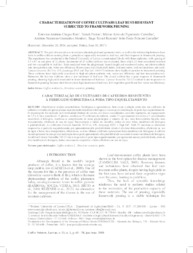Characterization of coffee cultivars leaf rust-resistant subjected to framework pruning.
Characterization of coffee cultivars leaf rust-resistant subjected to framework pruning.
Autoria: REIS, E. A. C.; FREITAS, T.; CARVALHO, M. A. de F.; REZENDE, T. T.; CARVALHO, J. P. F
Resumo: The goal of our work was to evaluate physiological and agronomic traits, as well as the relationship between these traits in coffee cultivars coming from a germplasm supposedly resistant to leaf rust, and their response to framework pruning. The experiment was conducted at the Federal University of Lavras in randomized blocks with three replicates, with spacing of 3.5 x 0.7 m and plots of 12 plants. An amount of 25 coffee cultivars was evaluated, from which 23 were considered resistant and two susceptible to leaf rust. Traits analyzed were the plagiotropic branch length and number of nodes, net photosynthetic rate, transpiration rate, water use efficiency, fluorescence and chlorophyll index, leaf area index, leaf rust incidence and yield. Catucaí Amarelo 20/15 cv 479, Araponga MG1 and Tupi IAC 1669-33 cultivars show highly responsive to framework pruning. These cultivars have high yield associated to high net photosynthetic rate, water use efficiency and low transpiration rate. Moreover, the last two cultivars show a low incidence of leaf rust. The Acauã cultivar has a good response to framework pruning, showing high yield associated to lower incidence of leaf rust. Catucaí Vermelho 785/15 cultivar is not responsive to framework pruning because show lower yield, high incidence of leaf rust, low vegetative growth and low water use efficiency.
Ano de publicação: 2018
Tipo de publicação: Artigo de periódico
Unidade: Embrapa Café
Palavras-chave: Coffea Arábica, Ferrugem, Hemileia Vastatrix, Variedade
Observações
1 - Por padrão são exibidas publicações dos últimos 20 anos. Para encontrar publicações mais antigas, configure o filtro ano de publicação, colocando o ano a partir do qual você deseja encontrar publicações. O filtro está na coluna da esquerda na busca acima.
2 - Para ler algumas publicações da Embrapa (apenas as que estão em formato ePub), é necessário ter, no celular ou computador, um desses softwares gratuitos. Sistemas Android: Google Play Livros; IOS: iBooks; Windows e Linux: software Calibre.
Acesse outras publicações
Acesse a Base de Dados da Pesquisa Agropecuária (BDPA) para consultar o acervo completo das bibliotecas da Embrapa.

